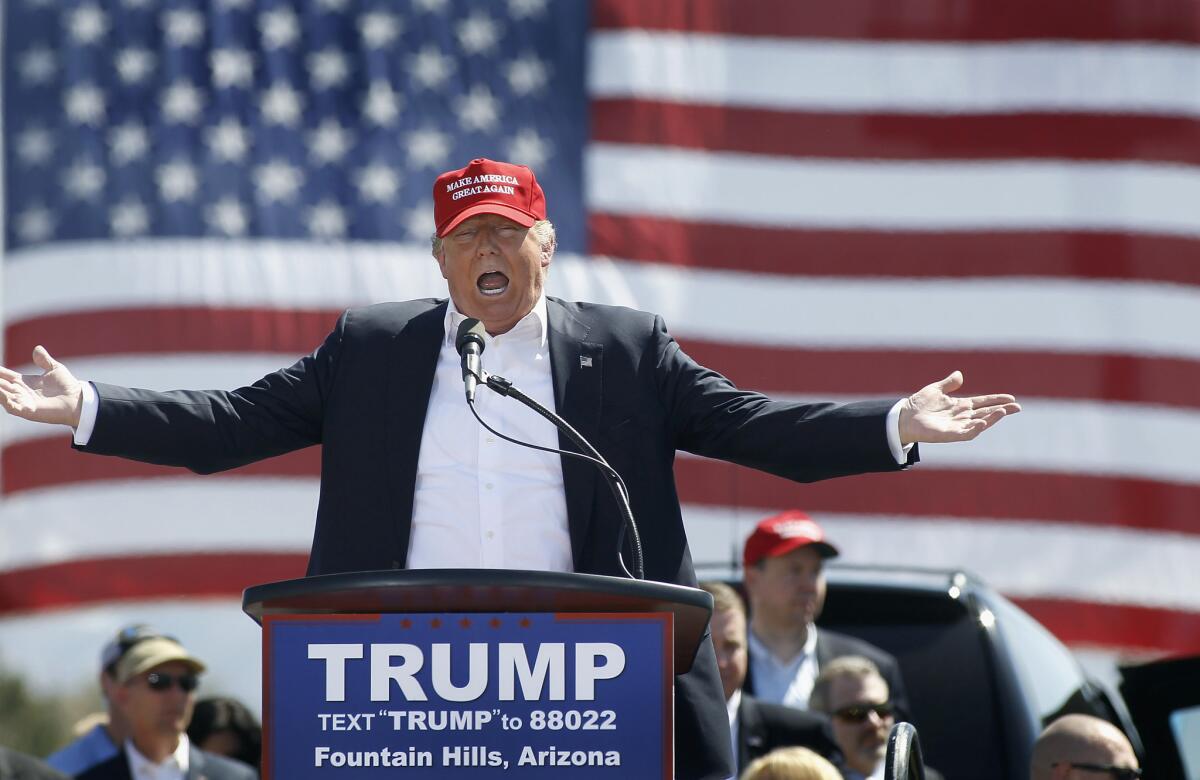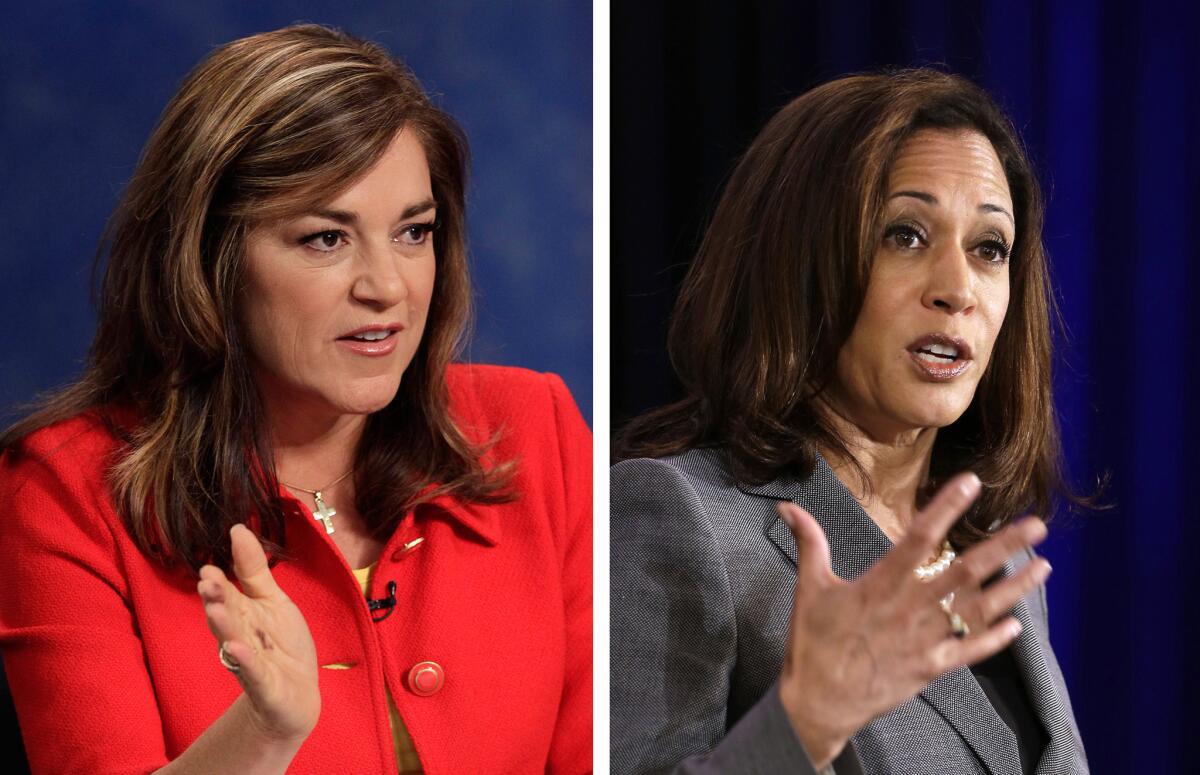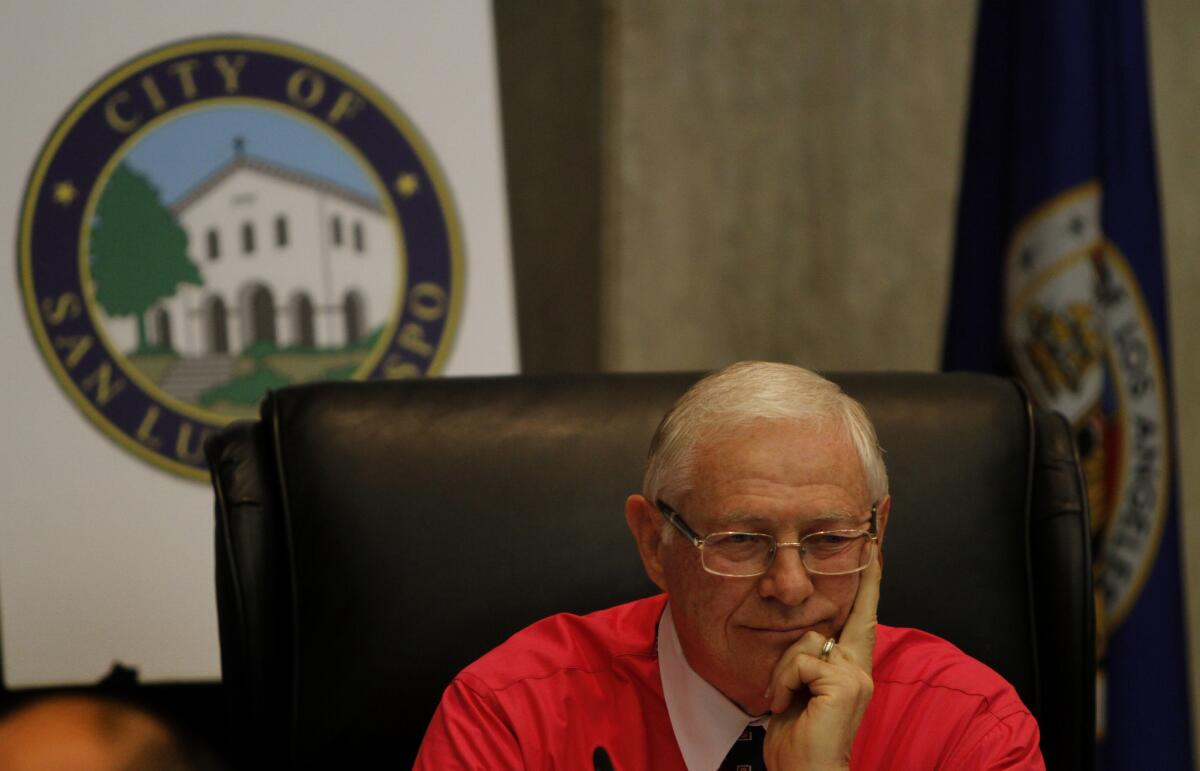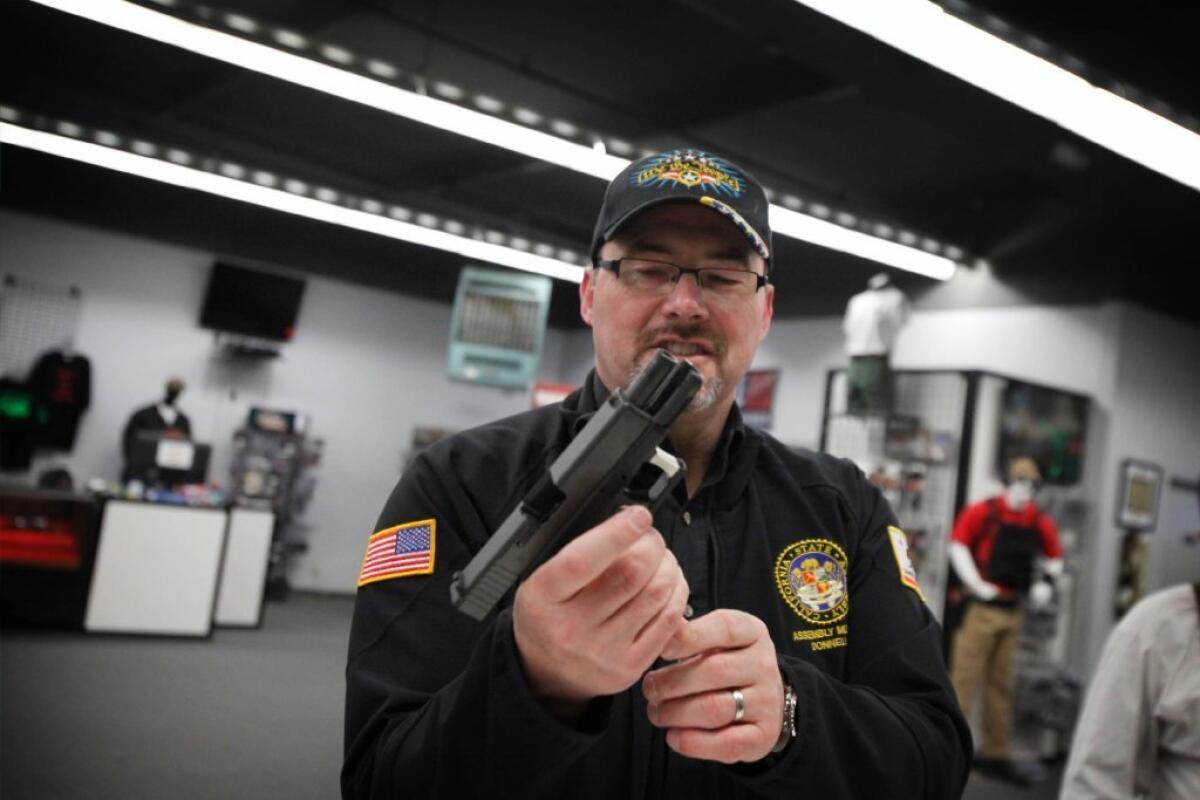Donald Trump is about to blow up the California primary. Here’s how

Donald Trump appears in Fountain Hills, Ariz., on March 19.
California’s traditionally ho-hum primary election is about to get whipsawed by the frenzy surrounding the 2016 presidential campaign. Because California may decide Donald Trump’s fate as the possible Republican nominee, the high-stakes contest is expected deliver a surge in voter turnout that could shake up races up and down the ballot.
“I think if Donald Trump is on the ballot, all the rules are out the window,” said Bay Area Democratic consultant Katie Merrill. “It’s a mad-as-hell-and-we’re-not-going-to-take-it-anymore electorate.”
Here are a few possible twists and turns to keep an eye on in the June 7 primary.
Who can vote?
Depends on which primary you're talking about.
Because the GOP holds a closed primary, anyone who wants to cast a ballot for one of the party's three remaining presidential candidates must be a registered Republican. That means no Libertarians, disaffected Democrats or decline-to-state voters frequently referred to as independents can participate — unless they re-register as Republicans.
Democrats allow decline-to-state voters to participate in their primary, but no one else. Green Party members and others would need to change party registration to get a chance to choose between Hillary Clinton and Bernie Sanders. With unaffiliated voters allowed to show up, that could help Sanders. The USC Dornsife/Los Angeles Times poll released this week found that decline to state voters preferred Sanders over Clinton, 44% to 35%.
The rest of the ballot will be a jungle primary for state Assembly and Senate races, congressional contests and the election to replace retiring U.S. Sen. Barbara Boxer.
Wait — what's a jungle primary?
California has a “top two” primary system. The two candidates who receive the most votes in the primary, regardless of party, face-off in the November general election.
For example, voters in the strongly Democratic 44th Congressional District in Los Angeles have 11 candidates to choose from on June 7. Because the best known contenders — state Sen. Isadore Hall (D-Compton) and former Hermosa Beach City Councilwoman Nanette Barragan — and all but three of the candidates on the ballot are Democrats, that means it's likely the top two Democrats would advance to the Nov. 8 ballot.
But if enough Republicans who show up to vote in the presidential race choose someone from their own party in the congressional primary, a Republican could conceivably come in second. That person would face a Democrat in the general and face a nearly impossible task given the lopsided nature of the district, which backed President Obama over Mitt Romney 85% to 14% in 2012.
The same dynamic could take hold in the 46th Congressional District in Orange County, where the two front-runners are former Democratic state senators Lou Correa and Joe Dunn.
Here's where that might get interesting
In the 24th Congressional District, for example, there is a cast of nine characters from both parties seeking to make it to the November ballot to replace retiring Democratic Rep. Lois Capps. And it's anyone's guess who might advance given the scarcity of polling and the relatively fluid nature of a crowded, open-seat contest.
So if the roughly 115,000 registered Republicans there show up in big numbers to vote in the presidential primary, that could give a boost to the top two GOP candidates running, Assemblyman Katcho Achadjian and Justin Fareed.
There are several Democrats in the race who want to topple the front-runner, county supervisor Salud Carbajal. Santa Barbara Mayor Helene Schneider and farmer Bill Ostrander, who is running as a liberal in the model of Sanders.
If one Democrat and one Republican advance to November, the Santa Barbara coastline just might be home to the most competitive race in the state. Obama won the district with 54% in 2012, but Capps only won by four points in 2014 and statewide contests have been much more closely divided.
The turnout question marks could also force Democrats running in tight races to reach out to moderate Republican voters, even in districts that lean heavily to the left.
Voting analyst Paul Mitchell said he wouldn’t be surprised to see that happening in the hotly contested Silicon Valley congressional battle between Democratic Rep. Mike Honda and his Democratic challenger Ro Khanna.
SIGN UP for our free Essential Politics newsletter >>

Then there's the Senate race
There's an argument that if Latinos show up in big numbers to send a message they don't like Trump, that could benefit Latino candidates on the ballot.
Nowhere is the question more pressing than in the Senate race, where Rep. Loretta Sanchez is attempting to make it to the general election to face Atty. Gen. Kamala Harris, who leads in the polls and has both national support and a massive fundraising operation. If one of the Republican hopefuls — Tom Del Beccaro, George “Duf” Sundheim and Ron Unz — manages to make it past Sanchez in June, Harris would be a near lock to win the seat in November given the state's Democratic leanings.
“It’s much more likely that one of the Republicans will get in,” Mitchell said.
If Latinos turn out and choose Sanchez, who has made her heritage a central point of her campaign, the general election could be a long and ugly slog that ends up with a Democratic senator either way.
Republican political consultant Mike Madrid sees having Trump on the ballot and campaigning in California triggering a voter backlash among Latinos to Sanchez's benefit. “I think Trump helps her,” he said.

Some state races are similar question mark
A Trump-fueled increase in voter turnout could help Republican Los Angeles County Supervisor Michael Antonovich glide into the November election for the 25th state Senate district, even though voter registration in the district is 41% Democratic and 30% Republican.
The race has a crowded field of Democrats, including former Democratic Assemblyman Anthony Portantino and former Pasadena Police Lt. Phlunte' Riddle.
Trump turnout could end Glendale utility tax
Here's another wildcard: the impact of local ballot measures – especially when it comes to taxes and school bonds. The wave of new voters attracted by Trump tend to relish the candidate’s hostility toward government and its spending ways, and that certainly is on the minds of city officials in Glendale.
The city is opposing a local ballot measure supported by local tea party activists to rescind the Glendale utility users tax, which delivers more than 15% of the city’s general fund revenue to pay for police, fire protection and other services.
“Yes, we are concerned,” said Tom Lorenz, spokesman for the city. “We’ve been paying attention to what’s been going on across the country.” Santa Monica pollster John Fairbank, who has been studiously trying to measure the potential “Trump and Bernie effect” on local ballot measures, finds Republicans are less supportive than Democrats and unaffiliated voters.

What about Trump coattails?
Former state Assemblyman Tim Donnelly, a Tea Party favorite who ran unsuccessfully for governor in 2014, jumped in at the last minute to challenge fellow Republican Rep. Paul Cook of Yucca Valley.
Donnelly, a talk radio show host who lives in the San Bernardino Mountains, said the successes of Trump and Sen. Ted Cruz in the Republican presidential campaign show this election favors “insurgent candidates” more than any time in recent history and he thinks that will favor his congressional bid.
Will that many people really show up?
If the race is still undecided at the time of California’s primary, Republican voter turnout could increase anywhere from 20 to 40 percent, based on what has occurred in other states, political analysts say.
Among Democrats, voter turnout is expected, at best, to be on par with previous presidential primaries. Turnout could be lower, however, because Clinton has such a wide delegate lead.
Then what?
The California electorate in the November general election will be far different than the makeup of voters who cast ballots in June. Obama won in 2012 with 59.3% of the vote.
If Trump becomes the Republican presidential nominee, political analysts expect a substantial anti-Trump movement in California during the general election, the first opportunity for non-Republicans to vote against him. Voter turnout among Latinos also would rise substantially, Madrid predicted.
“California has huge Spanish-language media markets … so you’re going to have much more reaction from the community,” Madrid said.
Democratic leaders in the Legislature say a backlash like that could help them regain the supermajority they enjoyed two years ago.
“To the extent presidential politics creates California coattails, 2016 is shaping up to be a banner year for Democrats,” said Senate President Pro Tem Kevin De León (D-Los Angeles). “In America’s most diverse state, I fully expect every demographic group he has systematically alienated over the course of this campaign to turn out in droves to vote against him and for Democrats up and down the ballot."
In the Senate 26 of the 40 members are Democrats, so that party only needs to pick up one seat to return to a supermajority. They need three more seats in the Assembly to reclaim one.
Assembly Speaker Anthony Rendon (D-Paramount) said he is not concerned Trump turnout would hurt in the Golden State.
“I do think Trump alienates a lot of voters; Republicans, independents and Democrats alike and I do think that will be good for Democrats in general,” Rendon said. “California is a different ballgame. I definitely think our independent voters tend to be more progressive than they are conservative and that’s going to help us.”
But...
California's ballot measures could scramble any normal general election presidential race math.
The state may have two, highly contentious initiatives on the ballot to stir up voters: A proposal to require background checks on gun owners buying ammunition and legalizing the recreational use of marijuana.
Neither proposal has qualified yet for the November ballot, but both have a more than legitimate shot.
The gun initiative is being championed by Lt. Gov. Gavin Newsom, who already has hopped into the 2018 gubernatorial race, and is fiercely opposed by gun-rights groups who plan to keep their campaign up through the fall.
The marijuana initiative is being backed by former Facebook president and Napster co-founder Sean Parker, who has donated $1 million of the $2.25 million raised by the campaign, and would make California the fifth state in the nation to legalize recreational use.
[email protected]; [email protected]; [email protected]
Follow @philwillon @mcgreevy99 @cbellantoni on Twitter for the latest news on California politics and sign up for the Essential Politics newsletter
This story was corrected to include Achadjian is a member of the Assembly, not the Senate and to reflect that Mike Gatto is no longer running.
ALSO:
Trump leads Republican primary field
Even Sanders supporters are united against common enemy: Trump
California's June primary just became crucial in the race for the White House
Full coverage of the USC Dornsife/Los Angeles Times poll
Your voices: What do you think of Donald Trump
Get the L.A. Times Politics newsletter
Deeply reported insights into legislation, politics and policy from Sacramento, Washington and beyond. In your inbox three times per week.
You may occasionally receive promotional content from the Los Angeles Times.










